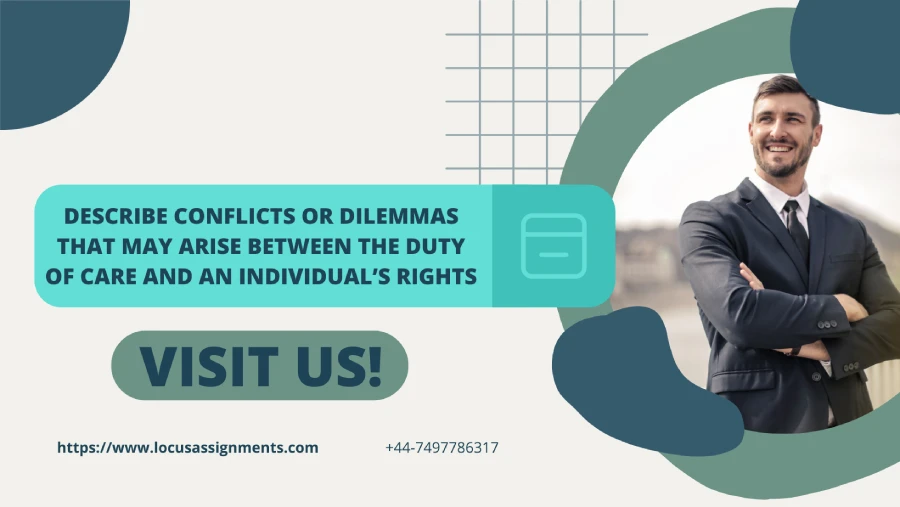Conflicts between duty of care and individual rights explained

2.1. Describe conflicts or dilemmas that may arise between the duty of care and an individual’s rights
Course- Level 3 diploma in care (RQF)
Unit 3 –Duty of Care in Care Settings
L.O. 2 –Know how to address conflicts or dilemmas that may arise between an individual’s rights and the duty of care
Conflicts or dilemmas between an individual's rights and a duty of care are often common in care settings and call for professionals to be careful, sensitive, and handle matters effectively. Duty of care means it is a legal and ethical responsibility to act in the best interest of the people for whom care is being provided, for making sure they are safe, that their well-being is considered, and they are not harmed. Individual rights, on the other hand, mean having the freedom to make choices with informed consent, having the right to privacy, autonomy, and being treated with dignity and respect. Conflicts between these two important principles may place professionals in difficult situations.
Important Conflicts and Dilemmas
Autonomy vs. Safety
Respecting someone's right to autonomy may conflict with your responsibility to keep them safe. They might want to avoid necessary treatment, such as not taking prescribed medication, treatment they clearly need. Supporting their autonomy in a request while recognizing the potential of harm creates a moral dilemma.
Privacy vs. Protection from Harm
Caregivers are obliged to keep any information shared private, but at times it may be necessary to disclose such information in order to protect the person from harm. Walking the ethical line between privacy and protection is a complex process.
Choice vs. Well-being
People may choose not to engage in a particular activity, even if that choice may be unsafe. For example, a person with dementia may choose to take unsupervised walks, meaning they may get lost or become injured. The importance of keeping people independent about their choice and protecting their well-being requires a sound exercise of judgment.
Right to Risk ("Dignity of Risk") vs. Duty to Protect
Supporting independence includes supporting their ability to take reasonable risks. This "dignity of risk" may be challenged or conflict with a provider's desire to oversafeguard, potentially limiting the service user's freedom and autonomy.
If you are a UK student working on similar topics in your assignments, and need online assignment help, Locus Assignments provides expert assignment helper support. From case studies to reflective tasks, you can get structured, well-explained answers tailored to meet RQF requirements.
Capacity and Informed Consent vs. Duty to Act
When service users did not have informed capacity to make a decision, refusing treatment may raise important considerations for the caregivers, human factors and ethical reasoning. Assessing whether someone has mental capacity, having other professionals present and/or are aware, and following relevant statutory and legal considerations are important in these instances.
Resource and Equality Considerations
Limited resources (staff, medications, equipment) may cause ethical dilemmas. When deciding on the distribution of limited resources among service users, overall fairness or equity may supersede individual needs and/or rights.
Summary
Such dilemmas often involve a balancing act across autonomy, safety, privacy, independence, and safety. Knowing about legislative framework (such as the Human Rights Act 1998), ethical guidance, safeguarding policies, and an individual’s care plan, is crucial to making sense of these situations.
Need help with the Assignment?
Get the expert assignment helper to make your work easy.
Fast • Reliable • Expert Support
Upload NowOther Assignments